Potřebujeme váš souhlas k využití jednotlivých dat, aby se vám mimo jiné mohly ukazovat informace týkající se vašich zájmů. Souhlas udělíte kliknutím na tlačítko „OK“.
ASTM D7050-04(2014)
Standard Practice for Rubber from Natural Sources—Sampling and Sorting Bales Based on Predicted Processing Properties
Automaticky přeložený název:
Standardní praxe pro Pryž z přírodních zdrojů & ndash; odebírání vzorků a třídění balíků na predikovaných vlastnostmi při zpracování základě
NORMA vydána dne 1.5.2014
Informace o normě:
Označení normy: ASTM D7050-04(2014)
Poznámka: NEPLATNÁ
Datum vydání normy: 1.5.2014
Kód zboží: NS-37425
Počet stran: 2
Přibližná hmotnost: 6 g (0.01 liber)
Země: Americká technická norma
Kategorie: Technické normy ASTM
Kategorie - podobné normy:
Anotace textu normy ASTM D7050-04(2014) :
Keywords:
hard rubber, natural rubber, processability, processing properties, sampling, soft rubber, sorting bales, ICS Number Code 83.060 (Rubber)
Doplňující informace
| Significance and Use | ||||||||
|
3.1 In accordance with Specification D2227, shipments of TSR10 and TSR20 must meet a minimum initial Wallace plasticity (Po) of 30 to be accepted. However, even with this minimum restriction, the uncured viscoelastic or “processability” properties are allowed to vary greatly. This variation in properties can significantly affect the quality and efficiency of a factory operation. 3.2 Bales of TSR10 or TSR20 which are lower in their uncured elastic quality (“soft” rubber) in some cases may impart better processing properties to tire innerliners, cushion gums, and sidewalls. “Soft” bales sometimes impart better building tack, better mold flow, and lower extrusion die swell with better dimensional stability. Also, these “soft” rubber bales may dissolve faster in solvents for adhesion dipping. 3.3 Bales of TSR10 or TSR20 that are higher in their uncured elastic quality (“hard” rubber) in some cases generate greater shearing during the initial stages of a factory mix, which result in a faster breakdown and a shorter mix cycle. 3.4 Therefore, in a factory operation, sometimes segregating TSR10 or TSR20 shipments into “soft” and “hard” categories can improve the efficiency and quality of a factory operation. |
||||||||
| 1. Scope | ||||||||
|
1.1 This practice covers the sorting of natural rubber bales of TSR10 or TSR20 in the factory according to their predicted processing performance based on differences in viscoelastic properties. 1.2 This practice determines which bales should be used in factory compounds which benefit from using “soft” natural rubber versus which work better with “hard” natural rubber. |
||||||||
| 2. Referenced Documents | ||||||||
|
Podobné normy:
Historická
1.7.2010
Historická
1.12.2010
Historická
1.11.2011
Historická
1.11.2011
Historická
1.12.2010
Historická
1.11.2011


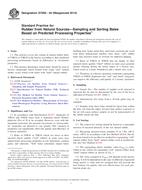
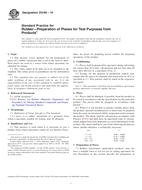 ASTM D3183-10
ASTM D3183-10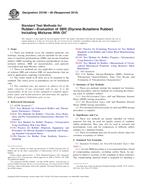 ASTM D3185-06(2010)..
ASTM D3185-06(2010)..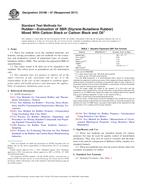 ASTM D3186-07(2011)..
ASTM D3186-07(2011)..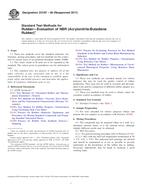 ASTM D3187-06(2011)..
ASTM D3187-06(2011)..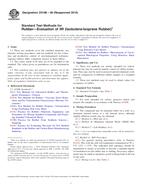 ASTM D3188-06(2010)..
ASTM D3188-06(2010)..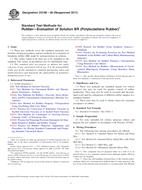 ASTM D3189-06(2011)..
ASTM D3189-06(2011)..
 Cookies
Cookies
